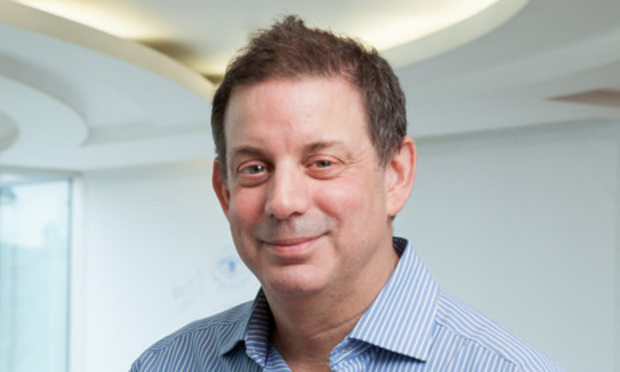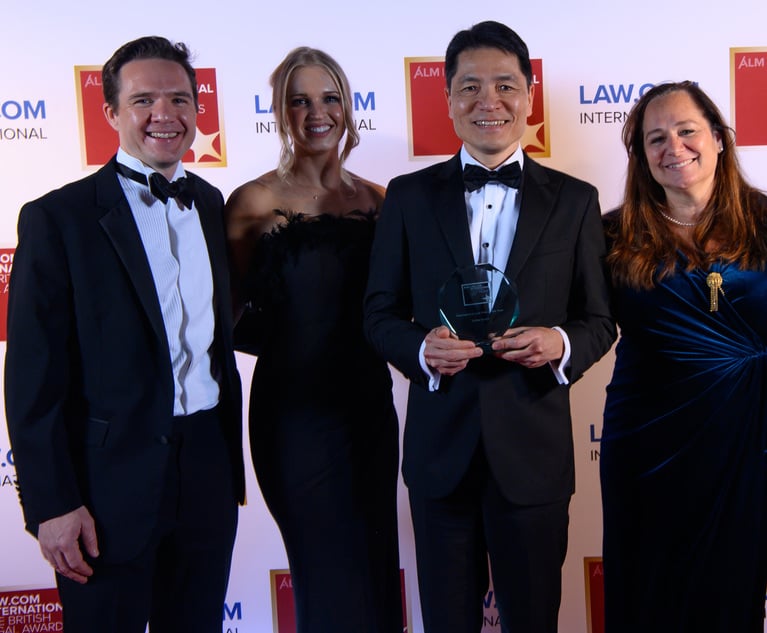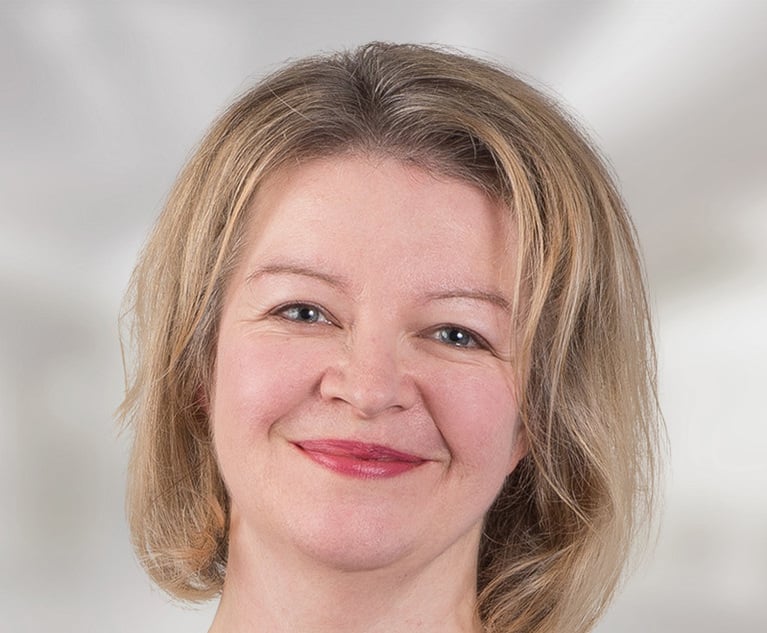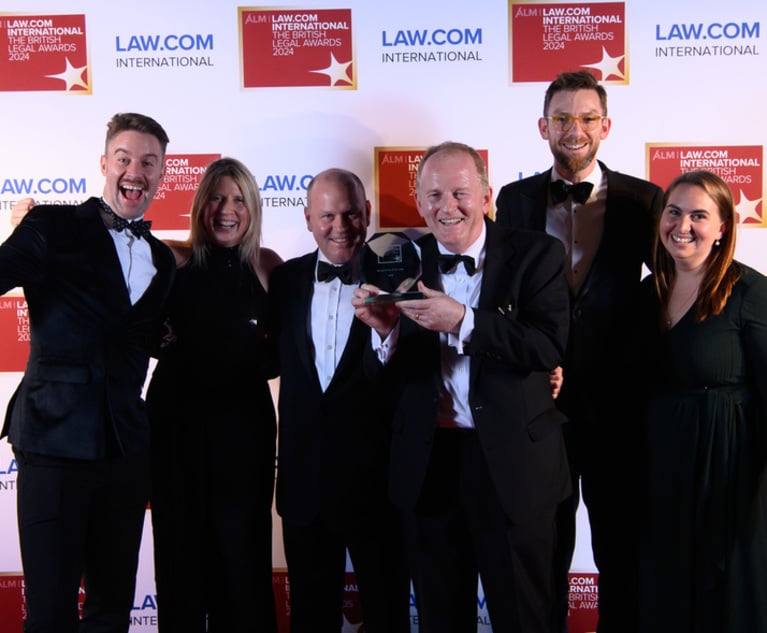Q&A: Three's UK GC on Over-Resourcing, Mindfulness and Working for 'The Prince of Darkness'
"It is important that [external counsel] keep an eye on the number of lawyers that they throw at the file," says Three GC Stephen Lerner.
November 07, 2019 at 04:26 AM
7 minute read
 Stephen Lerner, Three
Stephen Lerner, Three
As general counsel and director of regulatory affairs at one of the U.K.'s biggest telecoms companies, Three U.K.'s Stephen Lerner oversees a 100-strong team responsible for driving legal, regulatory and commercial strategies at the company.
Before joining Three more than 15 years ago, Lerner was a lawyer in Clifford Chance's London office for just under four years. It followed a spell at CMS, which he joined after emigrating to the U.K. from Canada.
He talks to Legal Week about the best and worst things about being a lawyer at a large company, his favoured law firms, and having books thrown at him by a mean partner.
Why did you become a lawyer?
I was always interested in politics and philosophy and studied both during my university undergraduate degree. There is a significant overlap between these disciplines and the study of law, so going to law school felt like the natural career choice.
Who has been the biggest influence on your career?
I am quite fortunate to have worked with so many talented people over the years. I could not pinpoint one person as there are so many people from whom I have learnt so much – but the key influences have not come from the legal profession, but from the inspirational leadership skills displayed by the CEOs that I have worked with (Dave Dyson and Kevin Russell), to the camaraderie I have experienced during my years on the senior management team at Three.
What's your proudest professional moment(s)?
Becoming general counsel at Three and joining at board level.
I think I am able to emphatically and purposely let other people be heard
What's the worst thing that's happened to you while on the job?
Working as a junior lawyer at a big City law firm for a nasty partner nicknamed the Prince of Darkness. I recall that he once threw a book at me.
What's your strongest characteristic?
Getting the most out of my team and others in the work environment. I think I am able to emphatically and purposely let other people be heard. I am very focused on making sure that I create an environment where people with varying styles and approaches have an opportunity to contribute and have a voice. I believe how you achieve something is just as important as what you achieve.
What advice would you give to young lawyers starting out?
Absorb knowhow and training from those around you and get as much practical experience as possible. If you are a transactional lawyer, that means working on as many deals as time permits. Having brilliant technical skills provides the basic foundation for all future roles and will open a lot of doors. Also, think about the industry sectors that interest you where you can have a passion for the outcomes rather than just the work. Our most passionate lawyers have a deep interest in media and the telecommunications market.
What are the best and worst things about your job?
The best: working with such a talented group of individuals who are passionate about Three and with all of us working collaboratively to ensure Three is successful. The worst: maintaining the right balance between family, self and work can, at times, be difficult (especially when working on a large project like our acquisition of U.K. Broadband).
What is the most common mistake that external counsel make when dealing with you?
Some firms over-resource matters. All firms want to do a great job and provide a quality service – but it is important that they keep an eye on the number of lawyers that they throw at the file.
It is all about getting excellent advice
In your experience, how much difference is there in quality between different law firms?
There are vast differences in the quality between different lawyers, and all the law firms that we use have great lawyers and not-so-great lawyers. I try to establish close relationships with our trusted lawyers and if they move firms, our business will usually follow with them.
Which are your favoured law firms?
Constantine Cannon (regulatory); Baker & McKenzie (commercial and employment); Shoosmiths (commercial); Cooke, Young & Keidan (commercial disputes); Ashurst (corporate and commercial); Linklaters (corporate, M&A and regulatory) and Freshfields Bruckhaus Deringer (competition).
Would you rather: pay less and get adequate advice or pay more and get excellent advice?
It is all about getting excellent advice. My experience is that the quality of the advice is dependent on the quality and effort of the individual lawyers providing the service rather than the size and billing rates of any particular law firm. I often rely on lawyers at small or regional law firms who I know will provide a great service, in preference to big City firms.
How does working in-house compare with private practice?
I cannot speak for other companies but within Three, being an in-house lawyer is a completely different role from being in private practice and the challenges are very different. In-house lawyers within Three partner up with the business units they support and jointly make commercial decisions, taking into account the relevant legal and regulatory guardrails. They then jointly own the consequences of those decisions over many months and years. In private practice, you are not the decision-maker and act only as an adviser on legal risks and consequences. That advice, usually provided over a relatively short duration, will then inform commercial decisions made by the business.
What is the daftest bit of corporate jargon you've heard?
An old boss used to repeatedly tell me: "Don't ask a question you don't know the answer to." I was thinking: "Isn't that the point of asking a question?"
What's the most outdated thing you've experienced in the industry?
That you have to ask your current mobile provider to leave to join a competitor. Although Ofcom, to its credit, has recently made it far easier, the U.K. is still a bit of an anomaly in that regard.
…and the most innovative?
5G home broadband – the ability to get fibre-speed broadband in a box you simply plug in the wall with no wires or engineers is game changing.
Describe your commute in 10 words or less
Non-existent. I live in Windsor, which is only five miles from the office, and I try to work at home at least one day per week.
Favourite boxset(s)?
Currently, it is Peaky Blinders and The Good Place.
Favourite pastime?
Spending time with the family. My 12-year-old son plays rugby on Saturday mornings and my eight-year-old daughter takes ballet and gymnastics lessons and has been learning to ski at the indoor ski dome, so I am a regular attendee at all their weekend events.
Have you ever had a spiritual experience?
No, but I have enjoyed taking mindfulness classes.
What would your motto be?
I do not have a personal motto – but if there was one guiding leadership principle it would be that you should see your role as enabling the success of others.
This content has been archived. It is available through our partners, LexisNexis® and Bloomberg Law.
To view this content, please continue to their sites.
Not a Lexis Subscriber?
Subscribe Now
Not a Bloomberg Law Subscriber?
Subscribe Now
NOT FOR REPRINT
© 2025 ALM Global, LLC, All Rights Reserved. Request academic re-use from www.copyright.com. All other uses, submit a request to [email protected]. For more information visit Asset & Logo Licensing.
You Might Like
View All
Judges Q&A: How to Win at the European Legal Innovation and Technology Awards
5 minute read
International Law Firm of the Year: A Q&A with Sidley Austin's London Managing Partner
5 minute readTrending Stories
- 1States Accuse Trump of Thwarting Court's Funding Restoration Order
- 2Microsoft Becomes Latest Tech Company to Face Claims of Stealing Marketing Commissions From Influencers
- 3Coral Gables Attorney Busted for Stalking Lawyer
- 4Trump's DOJ Delays Releasing Jan. 6 FBI Agents List Under Consent Order
- 5Securities Report Says That 2024 Settlements Passed a Total of $5.2B
Who Got The Work
J. Brugh Lower of Gibbons has entered an appearance for industrial equipment supplier Devco Corporation in a pending trademark infringement lawsuit. The suit, accusing the defendant of selling knock-off Graco products, was filed Dec. 18 in New Jersey District Court by Rivkin Radler on behalf of Graco Inc. and Graco Minnesota. The case, assigned to U.S. District Judge Zahid N. Quraishi, is 3:24-cv-11294, Graco Inc. et al v. Devco Corporation.
Who Got The Work
Rebecca Maller-Stein and Kent A. Yalowitz of Arnold & Porter Kaye Scholer have entered their appearances for Hanaco Venture Capital and its executives, Lior Prosor and David Frankel, in a pending securities lawsuit. The action, filed on Dec. 24 in New York Southern District Court by Zell, Aron & Co. on behalf of Goldeneye Advisors, accuses the defendants of negligently and fraudulently managing the plaintiff's $1 million investment. The case, assigned to U.S. District Judge Vernon S. Broderick, is 1:24-cv-09918, Goldeneye Advisors, LLC v. Hanaco Venture Capital, Ltd. et al.
Who Got The Work
Attorneys from A&O Shearman has stepped in as defense counsel for Toronto-Dominion Bank and other defendants in a pending securities class action. The suit, filed Dec. 11 in New York Southern District Court by Bleichmar Fonti & Auld, accuses the defendants of concealing the bank's 'pervasive' deficiencies in regards to its compliance with the Bank Secrecy Act and the quality of its anti-money laundering controls. The case, assigned to U.S. District Judge Arun Subramanian, is 1:24-cv-09445, Gonzalez v. The Toronto-Dominion Bank et al.
Who Got The Work
Crown Castle International, a Pennsylvania company providing shared communications infrastructure, has turned to Luke D. Wolf of Gordon Rees Scully Mansukhani to fend off a pending breach-of-contract lawsuit. The court action, filed Nov. 25 in Michigan Eastern District Court by Hooper Hathaway PC on behalf of The Town Residences LLC, accuses Crown Castle of failing to transfer approximately $30,000 in utility payments from T-Mobile in breach of a roof-top lease and assignment agreement. The case, assigned to U.S. District Judge Susan K. Declercq, is 2:24-cv-13131, The Town Residences LLC v. T-Mobile US, Inc. et al.
Who Got The Work
Wilfred P. Coronato and Daniel M. Schwartz of McCarter & English have stepped in as defense counsel to Electrolux Home Products Inc. in a pending product liability lawsuit. The court action, filed Nov. 26 in New York Eastern District Court by Poulos Lopiccolo PC and Nagel Rice LLP on behalf of David Stern, alleges that the defendant's refrigerators’ drawers and shelving repeatedly break and fall apart within months after purchase. The case, assigned to U.S. District Judge Joan M. Azrack, is 2:24-cv-08204, Stern v. Electrolux Home Products, Inc.
Featured Firms
Law Offices of Gary Martin Hays & Associates, P.C.
(470) 294-1674
Law Offices of Mark E. Salomone
(857) 444-6468
Smith & Hassler
(713) 739-1250










